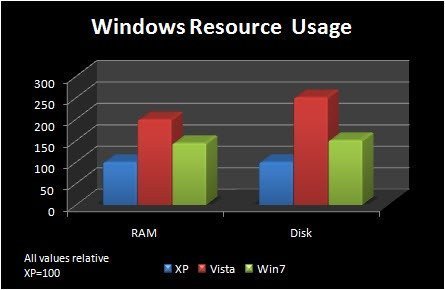Windows XP
SAFE HANDS: For all its irritations, Windows Vista's UAC will keep your system secure - and the utility is improved in Windows 7 What's more, UAC acts as the foundation for other useful features. Windows 8 Memory Consumption: The easiest way to make a ballpark comparison of Windows 8 vs. Windows 7 memory use is to install both operating systems on a 1GB RAM machine (minimum OS RAM requirement) and compare them when they've been rebooted multiple times, and then idled for a while. The below graphics compare memory.
vs Windows Vista vs Windows Se7enMinimum hardware:
Windows XP:
* Processor: 300MHz
* RAM: 128MB
* Super VGA graphics device
* HD: 4.2 GB (for SP3)
Windows Vista:
* Processor: 1GHz
* RAM: 1 GB (32-bit), 2 GB (64-bit)
* Support for DirectX 9 graphics device with 128MB of memory
 * HD: 20 GB (32-bit), 40 GB (64-bit)
* HD: 20 GB (32-bit), 40 GB (64-bit)
Windows 7:
 * Processor: 1 GHz
* Processor: 1 GHz* RAM: 1 GB (32-bit), 2 GB (64-bit)
* Support for DirectX 9 graphics device with 128MB of memory
* HD: 16 GB (32-bit), 20 GB (64-bit)
Interface:
Windows XP:
* Luna theme
Windows Vista Vs Windows 7
* Introduces task-based windows options
* Skinning possible but difficult
* Desktop Cleanup Wizard automates removing old icons
Windows Vista:
* Aero theme
* Introduces transparent panes, window animations, live thumbnails of running programs
Compare Between Windows Vista And Windows 7 Activator
* New desktop sidebar supports gadgets
* Supports touch screens
Windows 7:
* Aero theme
* Supports slideshow backgrounds, RSS and theme packs
* Introduces Aero Shake and Aero Snap
* Desktop gadgets can be placed anywhere
* Supports multitouch on touchscreens
Explorer:
 Windows XP:
Windows XP:* Replaces tree navigation by default with task pane
* Improves image handling
* Offers thumbnail previews and group views
* Supports some metadata
Windows Vista:
* Task pane integrated into toolbar
* New breadcrumb navigation
* New metadata display
* Improved icon resolution
* Some documents can be edited from the preview pane
Windows 7:
* Support for federated searches and libraries
* Virtual folders aggregate content from local and networked drives
Start menu:
Windows XP:
* New layout
* Devices and some Control Panel options appear in menu
Windows Vista:
* Added search box
* All Programs folder changed to a nested format
* Configurable power button
* User profile picture

Windows 7:
* Taskbar jumps appear in the Start menu and replace the right column when viewed
Update Windows Vista To Windows 7
* Documents, Pictures, Music buttons now link to their libraries* Control Panel options have been integrated into search results
Taskbar:
Windows XP:
* New look
* Hideable icons in System Tray
Windows Vista:
* Refreshed look
* ALT-Tab hot key now shows preview thumbnail of program
Windows 7:
* Interactive mouse-over preview panes
* Replacement of the Quick Launch bar with pinned programs
* Program-specific jump lists based on pinned programs
* Aero Peek for mouse-over desktop viewing
* Revamped System Tray
Devices:
Windows XP:
* Introduces Universal Plug-n-Play
* New driver library allows for downgrading drivers when necessary
Windows Vista:
* Debuts portable device API, designed to communicate with cell phones, PDAs, and portable media players
* Introduces Sync Center for managing data synchronizations
Windows 7:
* New Device Stage provides a centralized, unified window for managing all aspects of printers and portable devices
Misc.:
Windows XP:
* Introduces context-menu CD and DVD burning from Windows Explorer
* Supports multiple versions of a single DLL to prevent programs from overwriting each other
* Introduces Hibernate and Sleep modes
* Remote Desktop for accessing a computer from another location
* Fast user account switching
Windows Vista:
* Built-in drive partitioning
* More powerful screen-capturing tool
* Hybrid Sleep and better configuration options for more nuanced power management
* User-based file-type associations
* Previous Version automatically backs up changes to individual files
Windows 7:
* Expands Windows Explorer disc burning to include ISOs
* Introduces XP Mode
Windows Vista Windows 10
* Expanded options for disabling components
* Can search text in scanned TIFF
* Additional power-saving features for laptops
Date Released:
Windows XP:
2001
Windows Vista:
Compare Between Windows Vista And Windows 7 64-bit
November 2006
Windows Vista To Windows 7 Upgrade
Windows 7:
2009-10
Source: Cnet
Edited by NealTheGuitarist, 19 May 2009 - 05:43 AM.